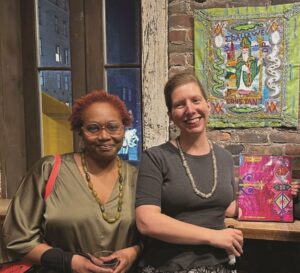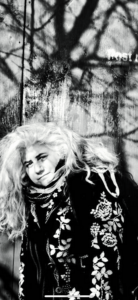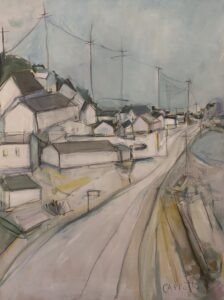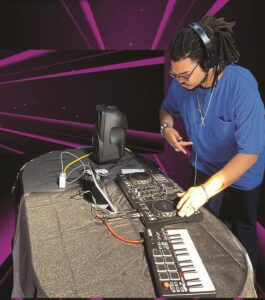Zooming In to a World of Art
On a good day, the drive from the Outer Cape to Falmouth can take the better part of two hours. But a series of talks presented by the Falmouth Art Center this season is just a few keyboard clicks away.

The center’s annual Spring Speaking of Art series will include four sessions led by prominent authors, curators, and art historians covering a wide range of subjects. In the first session, on Wednesday, March 22, author Hugh Eakins will discuss his book Picasso’s War: How Modern Art Came to America, which tells the story of how a landmark 1939 exhibition at the Museum of Modern Art introduced Picasso and other avant-garde artists to a hitherto skeptical (and sometimes hostile) public.
Another recent acclaimed book will be the subject of the next session on Thursday, March 30: John Taylor “Ike” Williams will talk about his 2022 book The Shores of Bohemia: A Cape Cod Story, 1910-1960, which focuses on the internationally prominent artists, writers, and intellectuals — including Eugene O’Neill, Willem de Kooning, Mary McCarthy, and Edward Hopper — who lived and worked in Provincetown, Truro, and Wellfleet in the first half of the 20th century.
Los Angeles-based curators Katherine Smith and Jerry Philogene will introduce the work of Haitian tapestry artist Myrlande Constant in a talk on Tuesday, April 4. Art historian Carol Scollans of UMass Boston will discuss the work of artist, educator, and activist Melissa Shook (1939-2020), known for her self-portraits and photography of marginalized peoples, in the final session on Thursday, April 13.
All talks will be presented on Zoom. Tickets for each talk are $25, or $80 for all four. See falmouthart.org or call 508-540-3304 for information.
Serving Up Some Fatty Pastrami

Julia Salinger’s new play Fatty Pastrami will debut in a free staged reading at the Truro Public Library on Saturday, March 18, 2 p.m. The reading is presented by the Truro Playwright Collective, a group of Outer Cape playwrights who produce readings monthly from October through April.
This is visual artist, poet, and actress Julia Salinger’s first play. “It’s about my relationship with my father, who died 21 years ago,” she says. The play takes place over a span of several decades, with the main character going from age 7 to 64, and combines comedic and tragic elements. Pastrami sandwiches feature prominently because Salinger’s father loved them. The comic relief helps balance the deeper ideas of the story. “It’s a play about human connection and how we come to forgiveness.” Salinger says. “It’s funny, and it’s also poignant.”
Salinger worked as an actor on the Cape for many years before she attempted playwriting and says she’s already looking forward to her next production. “I’ve always been really funny,” she says. “I’m also fearless. I can’t wait to start my next play.”
See trurolibrary.org and truroplaywrightcollective.org for information. —Eve Samaha
Karen Cappotto’s Teetering Townscapes
Karen Cappotto’s work is rooted in the landscapes and built environments of Provincetown. A selection of her loose, painterly townscapes is on view at the Wellfleet Adult Community Center’s Great Pond Gallery (715 Old Kings Highway) through March 31.

In these paintings, Cappotto is primarily concerned with the contrast between architecture and shoreline. Boxy buildings crowd along water and serpentine streets, painted with a speed and fluidity that makes viewers feel as if they’re racing through town. Everything feels ramshackle and transitory: if you don’t look quickly, it will pass you by.
This approach is perhaps best encapsulated in a nocturne depicting shacks on pilings in Provincetown Harbor. Cappotto executes the painting in concert with her subject matter: the lines depicting the shacks are stable but tentative. She works on a black ground: the only colors are the muted green of the shacks and splashes of blue and white representing moonlight on water. The phrase “the color of money” captions the scene on the canvas. It’s not lost on Cappotto that these humble structures, so beloved by artists over the years, are now multi-million-dollar properties. In context, the feeling of instability in her work takes on more ominous import. —Abraham Storer
Student Poetry for Social Change
A new program for high school students is hoping to make the world a better place, one poem at a time.
This semester, Nauset Regional High School English teachers Beth Seiser and Genna Margotta and their ninth-grade students will begin a project-based unit on the power of poetry to effect social change. The program will begin with an event at the Eastham Public Library on Friday, March 17.

Over the course of a dozen classes, students will read poetry and listen to music with social justice themes. Then they will identify an issue they care about and read a poem or sing a song that will be incorporated into a video montage.
At the kickoff event at the library, local poets Christine Ernst and Abbie Tighe, current Fine Arts Work Center writing fellow Jorrell Watkins, and Grammy-nominated composer, producer, and recording artist The ZYG 808 will speak about their creative processes and present examples of their work. They will also later visit the students at NRHS to provide mentorship during the unit.
“Language changes how we think,” says Seiser, who adds that the students will be encouraged to focus on social justice issues they see in their own communities. “Then they’ll take their passion and communicate it to others through the power of words.”
The students’ work will be presented at the library in an exhibit in May, and a reception for students, teachers, school administrators, parents and members of the library community is scheduled for May 9. See easthamlibrary.org for information. —Dorothea Samaha



